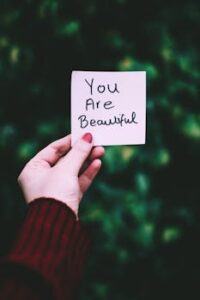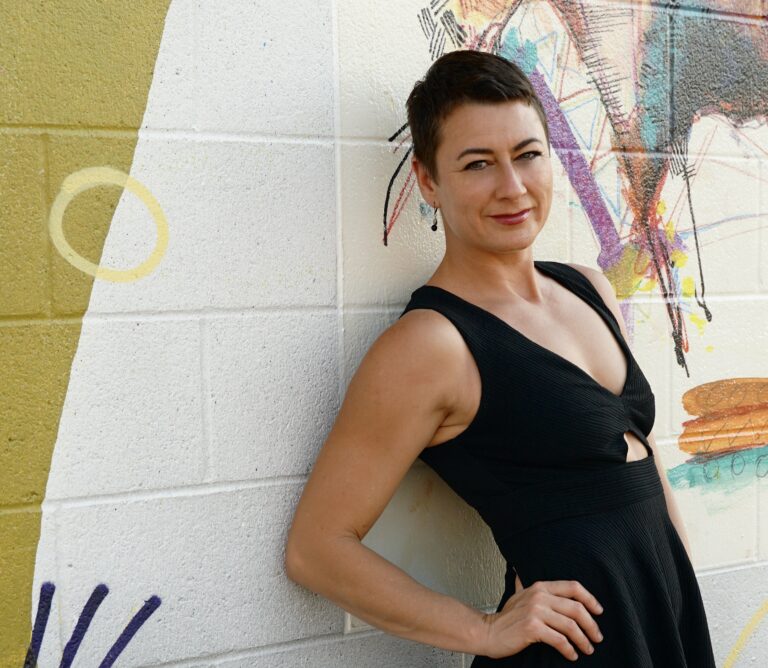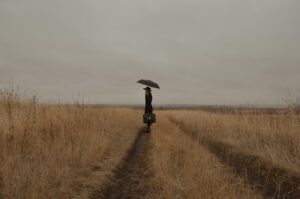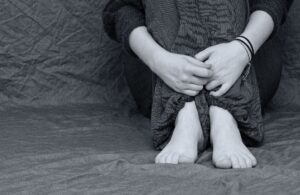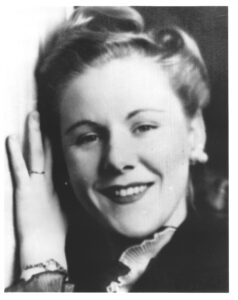The Beauty of Becoming: Letting Go of Comparison in Aging
I’ve started to notice my aging more than ever. As I’ve spent time building online content and going through photos, I see how much my skin has changed in just a few years. It gives me pause to think about how that process is accelerating. Every time I make a video, I notice the bags under my eyes and the uneven skin tone. A few months ago, I previewed my website on a large computer screen and was shocked at my enlarged photo. As I sat down to do the obligatory image retouching, correcting a multitude of blemishes and enlarged pores with my cursor, it was hard not to question if I ought to wear a bag over my head in perpetuity. But rather than succumb to self-loathing and fixation with my perceived flaws, I felt an inner tension urging me to dive inward and explore what was stirring beneath the surface.
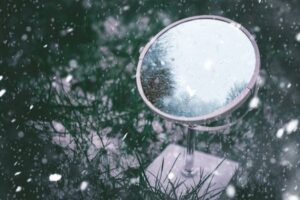
Over the course of several months, these insecurities had been vieing for my attention, until they reached a fever pitch I could no longer ignore. The crescendo came when I chose to stay in a relationship where these growing vulnerabilities were constantly exposed. My partner’s frequent references to my appearance stirred me in places I’d allowed my awareness to grow dormant. I’d forgotten these long held insecurities, buried them deep, and done my best to forget I had them. It felt as though an unconscious part of me had drawn me to this partner in order to spotlight the parts of me still yearning for love and acceptance—not from him, but from myself. It felt as if an old wound, covered over by layers of psychic bandages had begun to fester, demanding fresh air and my careful attention.
I’ve always had a profound love of beauty, seeking it in nature, art, and people. But just as I once sought love outside myself to complete me, I have sought beauty externally, feeling bereft of it within myself. Seldom satisfied and always hyper-critical of my own appearance, I rarely lingered on my reflection; accustomed instead to hastily brushing aside disappointment.
As this inner wound began to surface like a deep and painful boil, I found myself picking at it, reopening it, making it raw: My gaze lingered longer on smooth, youthful brows and smiles that don’t fold up like a paper fan at every corner. I even looked back wistfully at my own supple face from just a few years ago. The one I had ironically despised at the time. The pain of feeling beauty slipping from my grasp, the fresh sting of its exclusivity and unattainability, grew more tender, bruising deeper with every poke and prod, whether from my myself or my former partner.
My analytical mind, ever eager to categorize and compare, fixated on measurement: stacking my reflection against past versions of myself, societal ideals, and carefully curated images. It demanded a determination of how I measure up, yet the trial dragged on for months with no conclusion. Each agonizing glance in the mirror awaiting the final verdict of inferiority and inadequacy.
Then, in the midst of one of those brief, habitual mirror assessments, a flash of insight broke through. It was a recollection of an affirmation I had created years ago:
Comparison kills contentment.
Measuring worth by rank is a not only illusive, but also destructive. Comparison ultimately divides. It fractures us, inwardly and outwardly. So many of us wrestle with comparison, especially when it comes to aging and beauty. The constant presence of mirrors, photos, videos, and now filters and social media images, has made self-scrutiny an everyday experience. However, in the vast stretch of human history, this is an entirely new phenomena. For most of our existence, we only knew the faces of others; our own reflection was a rare encounter. I know I’m not alone in my penchant for insecurity and self-assessment. But I realize: I will never find satisfaction in comparison, especially when it places others in an imagined position of superiority.
I wish that moment of clarity had been enough to change my behavior instantly. But I’ve learned that healing cannot be forced just because we gain new awareness, no matter how pure or lofty the intention. I must organically shift from the inside toward the light, the way a blossom naturally unfolds under the right conditions. Healing any wound—whether physical or emotional—unfolds in its own time and under its own unique conditions.
I practiced self-acceptance by asking: What if I sit with the sadness without needing to fix it?
What if I allow myself to grieve it as something real and tender.
My body is changing and will continue to do so, and that brings up feelings—that’s okay.
I don’t have to override those feelings with positivity or force them away. I can meet them with care and tenderness, realizing I’m just peeling back a fresh and deeper layer of my self-worth paradigm. By witnessing and holding it with compassion, I allow it to unfold and release at its own pace.
I may not welcome every new wrinkle, the blotchy skin, the multiplying sun spots, or the little sags here and there, but I can soften my perspective. Instead of judging my reflection, I can witness her. I can sit with joy and gratitude in this miraculous body, even as she slowly and inexorably withers around me like a sweet little prune.
It’s okay to grieve the youthful version of myself, while recognizing that she is not gone; she has simply deepened.
And I, right now, in this fragile body and this fading skin, am still worthy of deep reverence.

The mind naturally loves to measure, assess, and rank–that is its job. But the heart knows another way.
The heart doesn’t measure. The heart experiences. The heart witnesses.
The heart knows beauty not as something to be ranked but as something to be felt.
Aging isn’t a loss—it’s an evolution.
It’s proof of life lived, of laughter, of late nights deep in conversation, of warm sun on soft skin, of experiences that have shaped me. What if, instead of seeing blemishes and changes as flaws, I began to see them as evidence that I am etched into the fabric of existence, shaped by the same forces that carve rivers and hew the edges of mountains?
I’ve often said that I want to become beautiful the way an ancient oak is beautiful:
No asymmetry disqualifies it, no stray branch is out of place, no deep line is rejected.
Yet somehow, she defies time and gravity, resilient, bending with storm and wind, while her equanimity and presence still the onlooker into a profound recognition of something deeper… Something beyond what is merely seen with the eyes.
She does not exist in comparison to any standard; she simply is.
Her inner core, lavishly girded with the concentric rings of persistence, embody the story of endurance and expansion.
Hers is a presence to be witnessed with reverence.
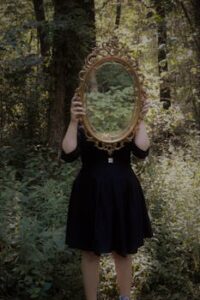
So what if, instead of looking at myself through the lens of assessment, I practiced looking through the lens of reverence?
We, in our flesh and blood, were never meant to be measured, ranked, or reduced to a sum of parts.
I, too, am a living record of time, written in skin and bone. A force, a presence. A living, breathing expression of something vast and immeasurable.
This is the way of the heart. It does not ask, How do I compare? but rather, How can I fully experience this moment? How can I embody more of myself, here and now?
The way of the heart is presence:
It’s dropping out of mental calculations and into the felt sense of being alive.
It’s allowing myself to be seen—not as something to be judged, but as something whole and sacred.
It’s knowing that beauty isn’t about youth, symmetry, or perfection. It’s about essence. It’s about being.
For years, I waged war with my own reflection, measuring myself against impossible standards and coming up short. The more I sought validation according to standards that were never mine to begin with, the more dejected and fractured I became. Comparison splinters us, dividing us against ourselves, convincing us that love must be earned through perfection.
But the heart doesn’t measure. It doesn’t compare. It simply witnesses. And in that witnessing, in that radical acceptance, it gathers the splintered pieces back into wholeness, loving them into harmony, into union, into completion.
While the mind seeks to rank and measure, the heart longs to weave us back into connection—with ourselves, with each other, with everything—beyond appearance, beyond status, beyond the hollow illusions of the masks we ceaselessly wear.
I already know the way of the heart. I practice it when I admire trees, mountains, and the people I love—when I feel their beauty as a deep, reverberating connection. The invitation is simply to extend that same reverence inward—to meet my own miraculous, magnificent, resilient, and immeasurable self with the same dignity and awe I so easily offer to the world around me.
